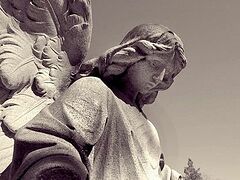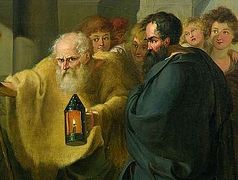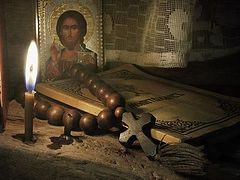 Artist Nikolay Komarov. Apostle Peter.
Artist Nikolay Komarov. Apostle Peter.
Man is small, but has a huge past. And sometimes he wants to go back to that past, as if walking into an antique shop. He wants to return at least once to the town of his childhood, where all the trees were tall. He wants to enter the house where he was born, to visit his old school and see the desk where he used to sit. Everyone has his or her own little “history”— perhaps not so sacred, but certainly treasured. Thinking of it softens the heart. It makes one aware of how quickly—too quickly!—time flies, of the changes that have taken place, and of the mystery of being.
This desire to go back is a permanent characteristic of the human soul, and one that is reflected in the gospels. Let us look, for example, at what the angel at the empty tomb said to the women. Jesus was not there, he was “going before” them to Galilee. “There,” he continued, “you will see him, as he told you” (Mk16.7). But why did Christ, who desired to suffer and rise again in Jerusalem, “go ahead of” the apostles to Galilee? Metropolitan Anthony Bloom suggests that it was because there, where the Lord had spent most of his time with them, everything would remind them of him. It was there that the apostles had found their “first love” (Rev 2.4), which is something impossible to forget. There that love would begin to burn within them again, with renewed vigour.
The Word of God is inexhaustible, and this gospel narrative may have other interpretations. But there are more occasions in the New Testament when an event, when examined, turns out to be a repetition of an earlier one. If we juxtapose the two, the result is beneficial.
There is, for example, the story of Peter’s call to apostleship and then the story of his return to apostolic dignity after his renunciation of Christ. Two different evangelists—Luke and John—describe these events. Luke, in the fifth chapter of his gospel, tells us about how he spent the whole night fishing without success. The Lord had been teaching the people from Simon’s boat, having asked him to put out a little from the shore. When he had finished, he asked Simon to put out into the deep and let down his nets. Despite having had a sleepless night during which he caught nothing, Simon shows obedience and lets down his nets. “Having done this, they caught a great multitude of fishes” (Lk 5.6). Significantly, the future apostle behaves not as a seeker of miracles, but as a man undeserving of them. He falls at the feet of Christ and asks Him to get out of the boat, for he, Simon, is a “sinful man”.
Peter saw then that things that were impossible without Jesus become possible with him. And he would himself soon have to do the impossible—to catch people in the “net” of evangelical preaching. He must fully understand and firmly bear in mind that this would be impossible without the help of Christ Himself. If Christ is near, then everything is possible. So, fish had been caught; but this was not the point. New horizons had begun to open up: “having pulled the boats ashore, they left everything and followed Him” (Lk 5.11). Everything in this narrative is worthy of attention: Peter's obedience contrary to the evidence, the rapidly filling nets, and the humility of the apostle who confesses himself to be a sinner in the presence of a manifest miracle.
Then, there were the few short but eventful years of the Lord’s preaching and ministry. Many times Peter witnessed the meek, unpretentious omnipotence of the Son of God. He saw the dead resurrected, He saw a fish with money in its mouth, enough to pay for the temple tax. He saw thousands of people sated with a small amount of food. He heard the voice of the Father on the mountain during the Transfiguration. And he himself, a former fisherman, by a gift from above became worthy of confessing Jesus as “Christ, the Son of the living God”.
But Peter renounced all of this. When days of unthinkable tribulation came, the “rock” cracked. Brave and resolute though he was, ready to follow Christ even to prison, even to death, drawing his sword in Gethsemane, Peter nevertheless denied the Teacher and Lord three times in the courtyard of the high priest. What was happening at that moment in his soul cannot be described. When he decided to return to his former way of life, bearing in his soul the shame and bitterness of renunciation, how unbelievably sorrowful must his words have sounded: “I am going fishing” (Jn 21.3).
Are you really going back to your nets and boats, Cephas, to toiling at night in order to support your family? “Yes,” thought Peter, “but I’m no longer Cephas. I am Simon the son of Jonah again. I am a catcher of fishб not, as the Lord said, of men.” And that sad fishing expedition, like the first, was disappointing. Sad and unsuccessful: “that night they caught nothing” (Jn 21.3). Perhaps the place where he was fishing was not far from the very place where he had first been called to apostleship. And now the Lord calls Peter back to Himself and to apostleship. He calls in the same way as once before.
“Just as day was breaking, Jesus stood on the shore” (Jn 21.4). He asked the disciples whether they had caught anything. And when he heard that they had not, he ordered the nets to be cast from the right side of the boat. Once again fish from all sides of the lake hurried into the net so as to serve Jesus obediently. Within a short space of time the net became heavy, as before. Then John said to a stunned Peter, “It is the Lord”. And, though naked, Peter rushed into the water and swam to the one whom he had denied, but who had not denied him.
If Matthew had sinned as Peter had done, he would perhaps have returned to his former occupation as a publican. Then Christ would have gone to find him again at his table, collecting taxes. And Matthew would have been touched by Christ’s love and by the feelings, now completely renewed, that he had experienced at their first meeting. But since Peter was a fisherman, it was on the lake that the Lord went to find him, and to humble him by the thrice-repeated question: “Do you love me?”
By means of the selfsame miracle that Peter was first called to apostleship, Christ again calls him and returns to him the dignity he had lost by his renunciation. This repeated miracle—and, with it, fidelity to the Master—must now be inscribed on Peter's heart indelibly.
But this applies not just to the apostles. Events in our own inner “sacred history” can be repeated as well. If they were always new and different, inattentive as we are, we would easily forget them. But when repeated by the grace of Providence and when juxtaposed in our minds, they start to shine brightly and in difficult times call us to repentance. A second appeal, similar to the first call, resurrects in our heart our “first love”, which is impossible to forget. Memory is able to return us to childhood—our childhood in terms of age, and also in terms of faith. And those who are like children are “the greatest in the kingdom of heaven” (Mt 18.1–2).



